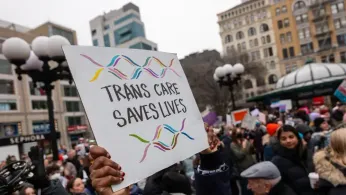
Nov 25
Federal Judge Blocks DOJ Subpoena for Trans Youth Medical Records
READ TIME: 3 MIN.
A federal judge in Pennsylvania has ruled against the U.S. Department of Justice’s attempt to obtain the medical records of transgender youth treated at Children’s Hospital of Philadelphia , marking the latest in a series of judicial rebukes of the government’s efforts to access private healthcare information related to gender-affirming care. The decision, announced on November 24, 2025, comes after families and patients filed motions to quash the subpoena, arguing that the request was overly broad and violated their privacy rights .
The subpoena, issued in July 2025, sought years’ worth of medical records for every patient under the age of 19 who received gender-affirming care at CHOP. The Justice Department claimed the investigation was related to potential fraud, but critics argued that the request was intended to intimidate providers and dissuade families from seeking care. The judge agreed, finding that the subpoena lacked a proper legal basis and was motivated by improper government interests .
This ruling follows a similar decision in Massachusetts, where a federal judge quashed a nearly identical subpoena issued to Boston Children’s Hospital. In that case, Judge Myong Joun concluded that the government’s actions were driven by bad faith and a desire to interfere with the state’s right to protect access to gender-affirming care . Both rulings have been praised by LGBTQ+ advocates and medical organizations, who say the subpoenas threaten patient privacy and could have a chilling effect on access to care.
Major U.S. medical associations, including the American Academy of Pediatrics and the American Medical Association, support gender-affirming care for adolescents and have expressed concern about the government’s actions. These organizations emphasize that such care is evidence-based and rarely involves surgery for minors, focusing instead on mental health support, hormone therapy, and puberty blockers .
The Justice Department has defended its actions, stating that it is using all legal tools to protect children from what it describes as harmful medical practices. Attorney General Pam Bondi has repeatedly stated that the department is committed to holding accountable those who “mutilate children in the service of a warped ideology” . However, critics argue that the subpoenas are part of a broader effort to undermine transgender rights and access to healthcare.
In response to the subpoenas, some healthcare institutions have stopped providing gender-affirming care to minors altogether. For example, UPMC has ceased offering certain treatments for transgender youth, citing escalating threats and risks . Families and patients affected by these changes have expressed fear that their confidential health information could be disclosed to the government.
The case at CHOP is ongoing, with the Public Interest Law Center representing a group of affected families and patients. The organization has asked the court to quash the subpoena with regards to all patient records and, if necessary, to create a process for families to register their objections . California Attorney General Rob Bonta and a coalition of 15 other attorneys general have also filed an amicus brief urging the court to limit the subpoena, calling it an “assault on privacy” and emphasizing that healthcare decisions should be made by patients, families, and doctors—not the government .
The rulings in Pennsylvania and Massachusetts represent a significant legal victory for transgender rights and patient privacy. As the legal battles continue, advocates say the courts’ decisions send a clear message: attempts to access sensitive medical records without a proper legal basis will not be tolerated.






